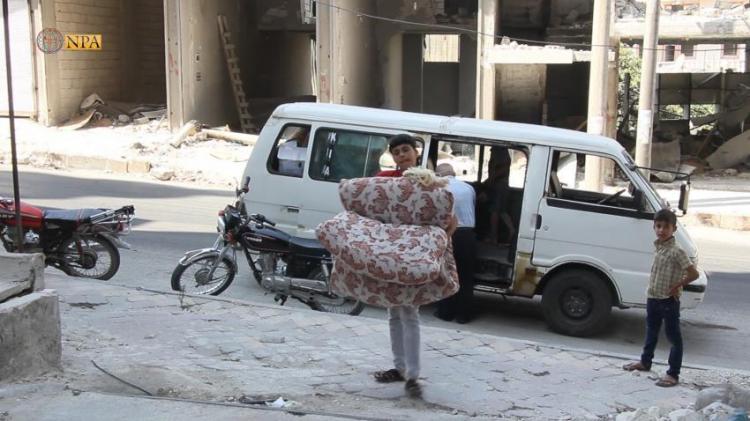Idlib – North-Press Agency
After the announcement of the ceasefire between the Syrian government and the armed opposition groups, amid the absence of aerial bombardment, the city of Jisr al-Shughur witnessed a turbulent three-day displacement due to the resumption of the shelling.
The shelling continued on the towns of Bidama and Maraand in the western countryside of Jisr al-Shughur, where the village of Maraand was hit by more than six air strikes by Russian fighter jets, resulting in civilian casualties and destruction of residential buildings.
Ismail Hasnawi the head of the local council of Jisr al-Shughur said that the number of displaced people who have returned to the city of Jisr al-Shughur after the ceasefire reached about 1,000 families, which is a little number in comparison to the original population numbers.
Hasnawi added that people have returned to check their houses and carry out some repairs to be able to return home.
He indicated that the organizations did not contribute to the restoration of the damaged houses by the bombardment operations, and now after the Syrian government’s abrogation of the truce, the citizens are afraid, while some of them had already begun to flee again.
For his part, head of the local council of the town of Bidama Suhaib Hassoun clarified that “the number of returnees is very small because the bombardment did not stop on the area.
Lack of services amid continued shelling
Hassoun said that services in the area are very poor, primarily the safety and basic services such as water, electricity, bread, and home restorations.
Omar Hassan, a displaced person from the village of Maraand said: “Three days ago, we were subjected to Russian airstrikes by fighter jets and I was slightly injured,” he added, “I will not be able to return with the escalation on the village and the region, and the difficulty of securing a living for daily life.”
Nader Hajj Hassan, a physically disabled displaced person said: “The village was subjected to Russian aerial bombardment, my seven-members family and I faced a lot of suffering because there were no tents, lack of work, difficult living, and no aid as we can’t go home due to the bombardment by the Syrian government and Russia”.
High rents and insufficient aid
Ghassan Darwish, a displaced person from Jisr al-Shughur said that despite the displacement towards neighboring villages, difficulties still accompany them, he pointed to the high rent of residential houses in the villages.
The rents of apartments have reached 15,000 to 50,000 Syrian pounds, which equivalent to 80 US dollars.
Darwish explained that the aid and support provided to IDPs was poor, and most of the IDPs were not provided with assistance.
He pointed out that the situation of Jisr al-Shughur and the villages that were being bombed is very bad.
These areas are located within the de-militarizing zones, where a ceasefire was agreed on last September, and within the de-escalation zones, which were agreed at the Astana talks.
On August 2, the guarantor countries confirmed the activation of the agreement and the ceasefire, but the Syrian government forces declared their non-compliance with the agreement, for what it described as “violations of armed opposition groups.”

